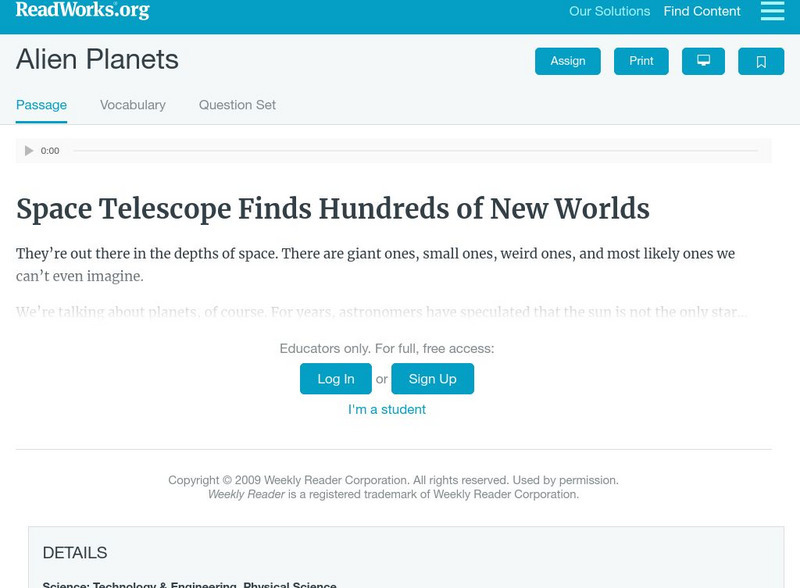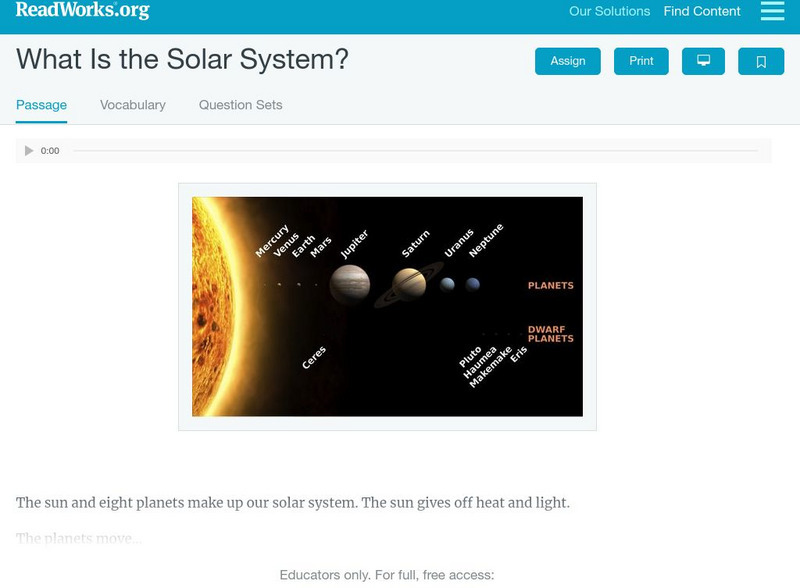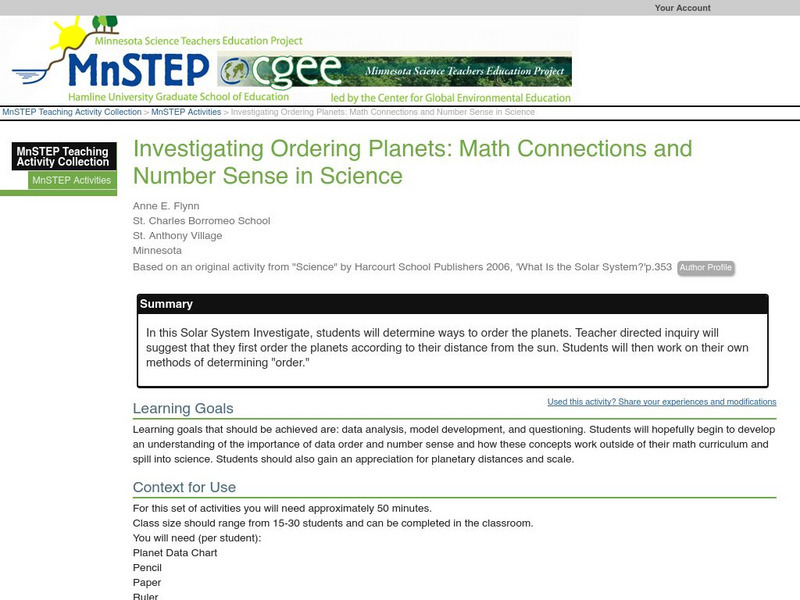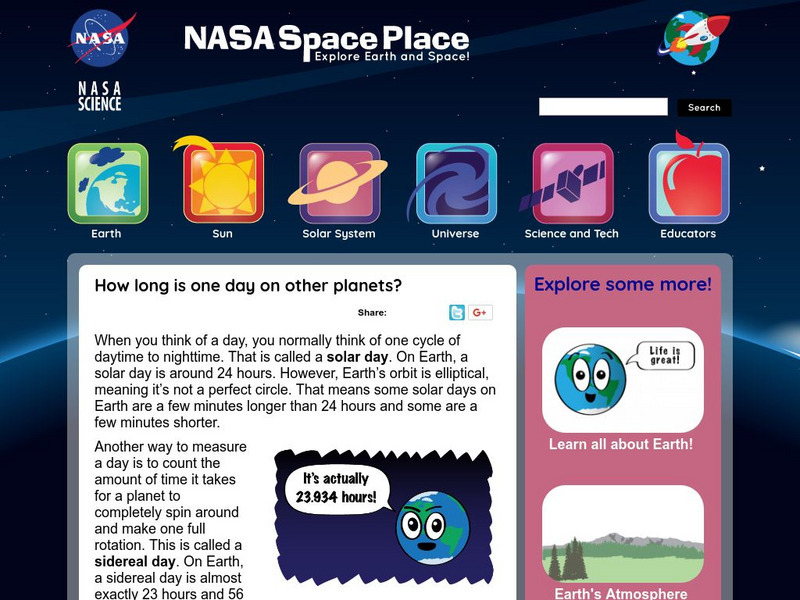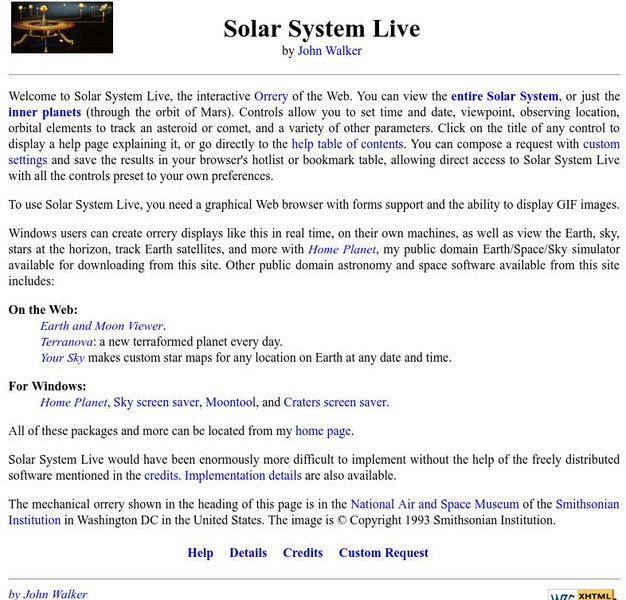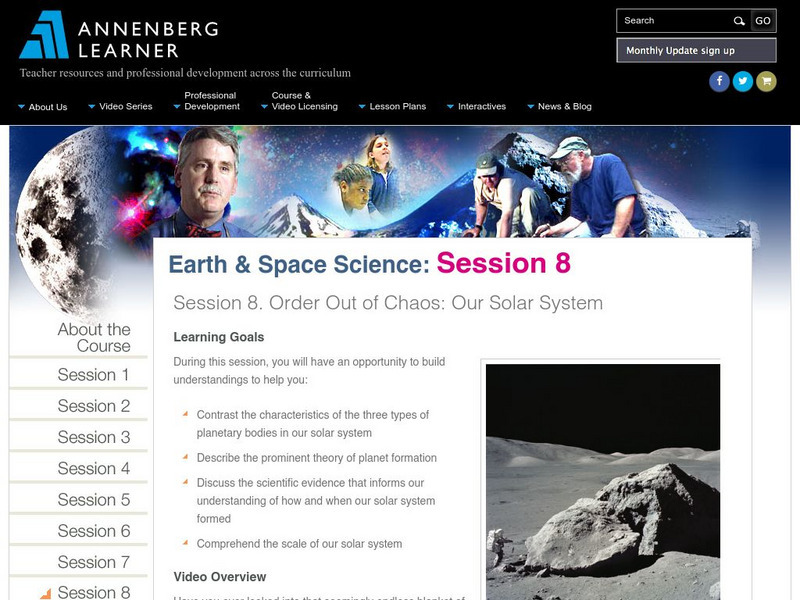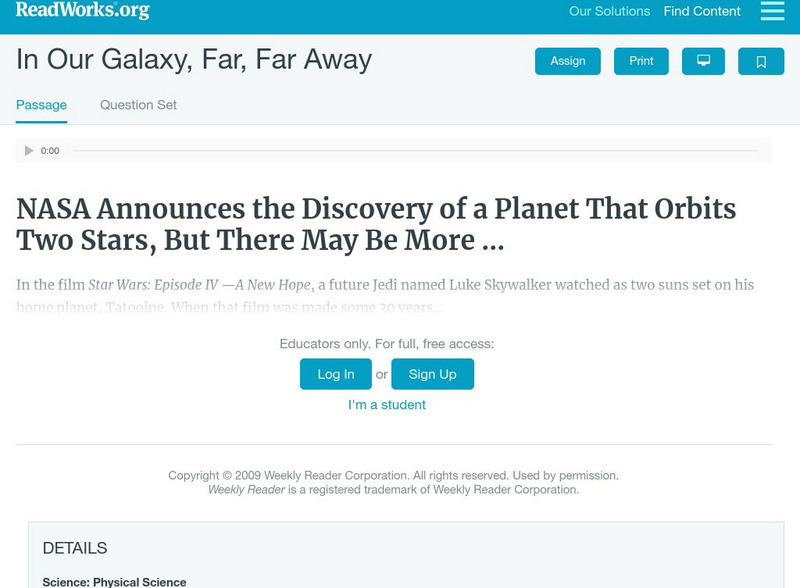Science Education Resource Center at Carleton College
Serc: Know Your Neighbors: Researching the Planets
Learners will study planets and moons in our solar system by working online and other resources. This lesson has students working together to generate a spreadsheet of data found. Learners will use this information to describe why Earth...
National Earth Science Teachers Association
Windows to the Universe: Our Solar System
Our solar system is filled with a wide assortment of celestial bodies - the Sun itself, our eight planets, dwarf planets, and asteroids - and on Earth, life itself! The inner solar system is occasionally visited by comets that loop in...
California Institute of Technology
Spitzer Science Center: Historias Desde Espacio: Premiacion a Las Planetas
All the planets are competing to see who is the best planet in the Solar System. Read the story in Spanish to learn the results of the pageant. Excellent source of information presented in a fun manner.
Alabama Learning Exchange
Alex: Lost in Space a Solar System Study
During this technology based lesson, students navigate the Internet to learn interesting information about the solar system. They use the information to complete a worksheet and to create a puzzle or challenge for their classmates.
Read Works
Read Works: Alien Planets
[Free Registration/Login Required] This nonfiction piece discusses the discovery of previously unknown planets in the solar system. This passage is a stand-alone curricular piece that reinforces essential reading skills and strategies...
Read Works
Read Works: What Is the Solar System?
[Free Registration/Login Required] An informational text about the solar system. A question sheet is available to help students build skills in reading comprehension.
Science Education Resource Center at Carleton College
Serc: Investigating Ordering Planets: Math Connections & Number Sense in Science
In this Solar System Investigate, students will determine ways to order the planets. Teacher directed inquiry will suggest that they first order the planets according to their distance from the sun. Students will then work on their own...
NASA
Nasa: Space Place: How Long Is One Day on Other Planets?
Here on Earth a day takes 24 hours. How long are days on other planets in our solar system? Find out here in three different ways, whichever meets your learning style the best.
NASA
Nasa: Sci Jinks: How's the Weather on Other Planets?
Compare weather here on Earth to other planets and moons in our solar system. You will find many similarities and differences.
Fourmilab Switzerland
John Walker: Solar System Live
This planetarium program allows you to create an accurate model of the solar system with icons or pictures of each planet. You can specify a date in the past or the future, change the viewpoint to any latitude/longitude, and even view in...
Nine Planets
The Nine Planets: Small Bodies
This site explores the smaller bodies in the solar system, namely the various asteroids and comets. Links are also provided for additional information on related subjects.
NASA
Nasa: Space Place: Messenger: Planet Mass Comparison
Compare the masses of planets in this interactive animation. Simply pile a number of Earths on one side of the scale, to balance with the mass of one Jupiter. Then try this with all the planets.
Annenberg Foundation
Annenberg Learner: Earth and Space Science: Order Out of Chaos: Solar System
Material to begin an exploration of the Solar System: the characteristics of the planets, theories about planet formation, and more. An hour-long video is accompanied by learning goals, an outline and overview, details on star formation,...
Utah Education Network
Uen: My Solar System
Students will use a simulation to build their own solar system discovering the relationship between gravity and motion that keeps a planet in orbit.
Read Works
Read Works: In Our Galaxy, Far, Far, Away
[Free Registration/Login Required] An informational text about earth-like planets in other solar systems. A question sheet is available to help students build skills in reading comprehension.
Enchanted Learning
Enchanted Learning: Zoom Astronomy: All About Space
A fantastic collection of information about the solar system. Includes information on all of the planets, the moon, the sun, asteroids, comets, meteoroids, and stars. Also find puzzles, a dictionary, quizzes, classroom activities, and...
NASA
Nasa: What Is a Planet?
This lesson teaches students about the characteristics of planets, comets, asteroids, and trans-Neptunian objects. After learning about these different things, students then are to debate about a new object that is found in space.
American Museum of Natural History
American Museum of Natural History: Ology: Cosmic Cookies
Roll your mouse over the planets in our solar system to read a vignette about each. Then, link to the recipe for directions to create miniature planet cookies that look like the real thing.
Alabama Learning Exchange
Alex: If Earth No Longer Existed. . .
Students will work in cooperative groups to research characteristics of each of the planets in our solar system. Students will design a travel brochure outlining the characteristics of each planet. Each group will make an oral...
University of Texas at Austin
The University of Texas Mc Donald Observatory: Jupiter
Discover interesting facts about Jupiter, the largest planet in the solar system.
University of Texas at Austin
The University of Texas Mc Donald Observatory: Saturn
Discover interesting facts about Saturn, the second-largest planet in the Solar System.
University of Texas at Austin
The University of Texas Mc Donald Observatory: Rock Cycle
This activity combines the concept of Earth's rock cycle with the characteristics of other planets in the solar system.
NASA
Nasa Space Place: All About Neptune
Learn fascinating facts about Neptune, the last of the planets in our solar system.
PBS
Pbs Teachers: Math Space Odyssey: The Capacity of the Planets
Use this activity to teach learners to represent numbers in scientific notation, and use geometry to solve problems related to three-dimensional figures. Explore distance and capacity problems about planets in the solar system. The...




